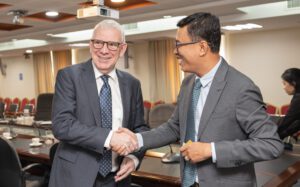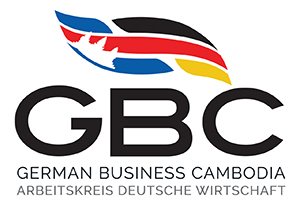- Posted on: January 29, 2024
Discussions on Development Cooperation with local Stakeholders

From January 24-26, 2024, Mr. Jochen Flasbarth, State Secretary at the German Federal Ministry for Economic Cooperation and Development (BMZ), visited Cambodia for meetings with various political stakeholders. The visit aimed to strengthen economic cooperation and developmental ties between Germany and Cambodia.
After a country briefing delivered by the German Embassy, GIZ and KfW, the first full day began with key engagements, including discussions with H.E. Chhieng Yanara, Senior Minister and Second Vice-Chairman of the Council for the Development of Cambodia (CDC), and H.E. Chan Narith, Under Secretary of State at the Ministry of Economy and Finance (MEF). Talks covered a range of topics, from future perspectives of German development cooperation with Cambodia, to inclusive economic growth and social protection. Subsequent talks with H.E. Eang Sophalleth, Minister of Environment, addressed Cambodia’s role in combating climate change and new initiatives for climate protection.
State Secretary Flasbarth’s delegation also visited the Institut Pasteur du Cambodge and its laboratory, discussing the testing of resistant pathogens and challenges of setting up laboratories to mitigate the impact of multiple drug resistances with director Prof. André Spiegel. State Secretary Flasbarth also held talks with the heads of the German political foundations in Cambodia, namely Konrad Adenauer Foundation and Heinrich Böll Foundation, to assess the current state of civil society in Cambodia.
After a visit to the Tuol Sleng Genocide Museum, the day concluded with a reception at the German Ambassador’s residence which saw several GBC members in attendance. During his welcome speech, Mr. Flasbarth praised the close partnership between Cambodia and Germany, appreciating the Cambodian government’s support for multilateralism and its stance for Ukraine. He closed his speech by advocating for the government to allow more open spaces for civil society in Cambodia.
On the final day, the program started with economic and investment-related topics during a briefing by GBC President Tassilo Brinzer, GIZ, and others. The meeting underscored Cambodia’s rapid economic advancements over the past decades, taking into account the role of German and international development cooperation in enhancing economic framework conditions and supporting the local private sector. It became clear that as Cambodia prepares to graduate from its Least Developed Country (LDC) status, trade and investments will become even more important drivers of development, presenting new opportunities for the German business community as well. At the same time, the briefing also concluded that German development cooperation with Cambodia will need to be realigned in the future to reflect this progress. The program continued with a field visit to a health centre and local community on social protection and healthcare in the context of the IDPoor project, supported by GIZ.
The afternoon session saw talks with H.E. Dr. Youk Sambath, Secretary of State at the Ministry of Health (MOH), and other high ranking MOH officials on strategies and challenges related to the decentralization of the Cambodian health care system, One Health and pandemic prevention measures. A subsequent field visit to a district administration enabled detailed discussions with local representatives on policy implementation in the context of decentralization and citizen-centered approaches for service delivery by local governments.
The program concluded with a visit to the Women Empowerment House (WE House) in Phnom Penh to discuss worker representation by trade unions in the Cambodian textile industry, as well as challenges and opportunities for the garment industry in the context of the German and European Supply Chain Act, and those faced by textile workers.
